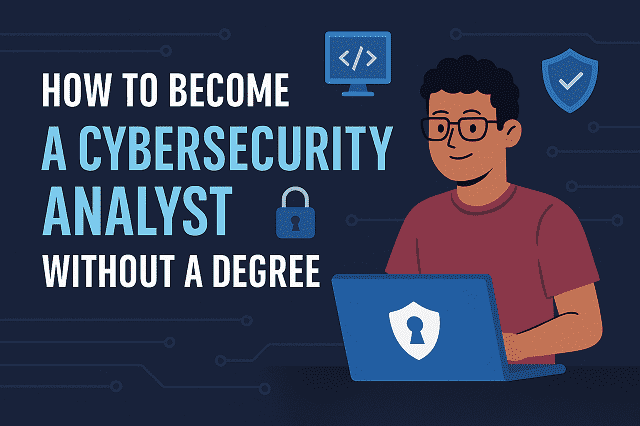Introduction to How to Become a Cybersecurity Analyst without a Degree
Breaking into the cybersecurity field might seem like a daunting challenge. That too, if you do not hold a college degree in computer science or information technology then it is a Herculean task. For years, a common belief has held many back: “You need a degree to work in cybersecurity.” But in today’s skills-first job market, that is no longer the reality.
In fact, you can become a cybersecurity analyst without a degree. Thousands of self-taught professionals are proving it every year. Employers are increasingly shifting their focus from formal education to real-world skills, hands-on experience, and relevant certifications. The cybersecurity industry is experiencing a massive talent shortage. Organizations are more open than ever to hiring passionate individuals who can demonstrate technical abilities, regardless of educational background.
According to Cybersecurity Ventures, there will be 3.5 million unfilled cybersecurity jobs globally by 2025. That is a huge opportunity for job seekers willing to learn, practice, and grow their expertise. Even if they are starting from scratch or switching careers they will get better positions in cybersecurity careers. Even if you are coming from a different tech field or have no IT background at all, it is entirely possible to build a cybersecurity career without a degree.
This guide on How to Become a Cybersecurity Analyst without a Degree will walk you through how to become a cybersecurity analyst without a degree. Further, it will tell you, what skills you need to focus on. In addition, it guides, you on the certifications that will boost your credibility. With this “How to Become a Cybersecurity Analyst without a Degree” guide, you know how to gain real-world experience that catches recruiters’ eyes. It is not easy, but it is achievable.
Let us debunk the myths and explore your learning path. In addition, let us show you how to break into cybersecurity without college—step by step.
-
Why You Do Not Need a Degree to Become a Cybersecurity Analyst
1.1 Changing Hiring Trends in Tech
For decades, job descriptions in cybersecurity would list “Bachelor’s degree in Computer Science or related field” as a requirement. The demand for skilled professionals continues to outpace supply. Therefore, employers are rethinking their approach to hiring.
Major tech companies, including Google, IBM, and Tesla have already removed formal degree requirements for many technical roles. The focus now is on real-world ability, not just academic qualifications. This shift is especially significant in cybersecurity. In cybersecurity, hands-on experience is far more valuable than theoretical knowledge alone.
With cybersecurity job vacancies on the rise, many employers are embracing skills-based hiring practices. They are looking for professionals who can hit the ground running, and identify threats. Further, they prefer professionals who can secure networks, and manage incidents effectively. Whether you learned those skills in a university or through self-paced learning and certifications does not matter as much anymore.
In short, the cybersecurity job market without a degree is more accessible than ever. That is especially true for candidates who can demonstrate capability through practice, projects, and perseverance.
1.2 Skills Over Credentials: What Employers Actually Look For
One of the biggest misconceptions about getting into cybersecurity is the overemphasis on academic credentials. However, in the real world, employers are not just looking for a degree. They are looking for job-ready candidates who can solve problems. They prefer candidates who can detect threats and respond to incidents quickly.
Here is what most hiring managers actually care about:
- Technical Skills: Knowledge of networking, operating systems, encryption, firewalls, and malware analysis.
- Certifications: Industry-recognized certifications like CompTIA Security+, Certified in Cybersecurity (CC), and Google Cybersecurity Certificate.
- Hands-on Experience: Even if it is through simulated labs, home setups, or platforms like TryHackMe and Hack The Box.
- Soft Skills: Critical thinking, communication, and the ability to work under pressure.
- Portfolio Projects: Personal projects, GitHub repositories, blog posts, or documentation of CTF challenges.
All of these can be achieved without a college degree. In fact, many hiring managers report that they are more impressed by a self-taught candidate with a passion for cybersecurity. Self-taught candidates have a proven track record compared to someone with a diploma but little practical experience.
1.3 Real-World Success Stories (Self-Taught Professionals)
If you are still wondering whether it is truly possible to build a cybersecurity career without a degree then just look at the real-world success stories that continue to surface every day.
Example 1: The Career Switcher
Sarah, a former retail manager, transitioned into cybersecurity in less than two years without going back to school. She started with free resources on YouTube, practiced regularly on TryHackMe, and passed her CompTIA Security+ exam. Today, she works as a SOC Analyst at a managed security services provider (MSSP).
Example 2: The High School Graduate
Jake did not go to college. Instead, he built a home lab. He documented his progress on LinkedIn. Further, he contributed to open-source projects and earned his Google Cybersecurity Certificate. He landed a junior cybersecurity analyst role at a fintech company just 18 months after starting.
Example 3: The Military Veteran
Tom used his military background and interest in tech to transition into cybersecurity post-service. He used his GI Bill to take a few certification courses. Tom participated in CTF events. He secured a role as an Incident Response Analyst.
These examples prove that with the right mindset, effort, and resources, you can become a self-taught cybersecurity analyst. And you could land a job without needing to invest in a four-year degree.
-
Key Skills Every Cybersecurity Analyst Needs
Even without a college degree, building a successful career in cybersecurity starts with mastering the right foundational skills. Employers want analysts who are technically competent and detail-oriented. They must be able to detect and respond to threats efficiently. Here is a deep dive into the skills needed to become a cybersecurity analyst for self-taught learners and those following a non-traditional path.
2.1 Networking Fundamentals
Understanding networking is the cornerstone of cybersecurity. If you are analyzing traffic logs, tracing malware communication, or monitoring suspicious activity on a firewall then you need to know how data moves through networks.
Key Networking Topics to Learn:
- OSI and TCP/IP Models: These models define how communication happens across networks. Know what each layer does. Know how data flows between them.
- IP Addressing and Subnetting: Learn how devices identify and communicate with each other. Subnetting is essential for segmenting networks and improving security.
- Common Protocols:
- TCP/UDP – Understanding connection types
- ICMP – Used in diagnostics (ping)
- DNS, DHCP, HTTP/HTTPS – How the web and internal services operate
- Ports and Services: Know which ports are associated with common services (Port 80 for HTTP, Port 443 for HTTPS).
- Firewall Rules and NAT: Understanding how traffic is allowed or blocked across networks.
- VPNs and Proxies: Learn how remote access and anonymity tools work.
Why It is Important:
When a security incident occurs, network logs are the first place you will look. Without understanding network protocols, IP flow, or firewall behavior, you will struggle to detect breaches or explain vulnerabilities.
2.2 Operating Systems (Linux, Windows)
Security threats are almost always executed on operating systems. Therefore understanding how they work, where vulnerabilities exist, and how to analyze them is essential for any aspiring analyst.
Linux Skills to Master:
- Terminal and Command Line: Learn how to navigate, create users, manage processes, and check logs.
- File Permissions & Ownership: Critical for understanding privilege escalation.
- Network Configuration & Services: Know how to manage services, run diagnostics, and inspect traffic.
- System Logs: Master /var/log files and how to monitor system activity.
Windows Skills to Learn:
- Event Viewer: Crucial for detecting malicious login attempts and system errors.
- PowerShell: Automate tasks, pull system information, and run scripts.
- Active Directory Basics: Most corporate networks use AD. Understand how users, groups, and policies work.
- Registry & Task Manager: Key areas for detecting malware or unauthorized changes.
Why it is Critical:
If you do not understand the OS environment then you cannot properly monitor, secure, or investigate it. Linux is often used on servers and in hacking tools. Windows is dominant in most of the enterprise settings.
2.3 Cybersecurity Basics (CIA Triad, Threat Types, Firewalls)
Before handling tools and technologies, every cybersecurity analyst must have a solid grasp of fundamental security principles and terminology. This knowledge forms the framework for more advanced learning and certifications.
Core Principles to Understand:
- CIA Triad:
- Confidentiality – Protecting sensitive data from unauthorized access
- Integrity – Ensuring data is accurate and unaltered
- Availability – Making sure systems and data are accessible when needed
- Common Threats:
- Malware – including ransomware, viruses, worms
- Phishing – Social engineering via email or SMS
- Man-in-the-Middle (MITM) – Intercepting communications
- Zero-Day Exploits – Attacks using undisclosed vulnerabilities
- Insider Threats – Internal users misusing access
- Security Controls:
- Firewalls – Controlling inbound/outbound traffic
- Intrusion Detection/Prevention Systems (IDS/IPS)
- Antivirus/EDR Solutions
Why It Is Important:
These concepts are frequently covered in interviews and certifications like Security+ or ISC2 CC. Understanding these ideas allows you to speak the language of cybersecurity. It helps you to make informed decisions when handling threats.
2.4 Scripting & Automation (Python, Bash)
As cybersecurity operations become more complex, automation and scripting are no longer optional, they are expected.
Why Scripting Is Valuable:
- Automation: Automate repetitive tasks like log parsing, scanning, and alert triage.
- Custom Security Tools: Build your own scripts to solve specific security problems.
- Faster Incident Response: Write detection scripts to flag anomalies or block IPs in real-time.
Recommended Languages:
- Python:
- Automate port scans with socket and os
- Parse JSON logs or API responses
- Develop custom alerting systems or monitoring tools
- Bash:
- Schedule security checks using cron
- Create batch scripts for log backups
- Run recon tools in Linux environments
Even basic scripting can set you apart in entry-level cybersecurity interviews if you are transitioning without formal credentials.
2.5 Security Tools (Wireshark, Nmap, Metasploit)
Knowing how to use cybersecurity tools is essential. These are the hands-on skills employers love to see when hiring entry-level cybersecurity analysts without a degree.
Tools to Master:
- Wireshark:
- Capture and analyze live network traffic
- Detect malicious payloads or suspicious IP activity
- Filter by protocol, port, and IP to isolate issues
- Nmap:
- Scan entire subnets for open ports
- Detect operating systems and services
- Create network inventories and map attack surfaces
- Metasploit:
- Launch simulated exploits in controlled environments
- Learn about vulnerabilities and exploit payloads
- Practice penetration testing in a legal, ethical way
Pair these tools with platforms like TryHackMe, Hack The Box, and RangeForce. That will help you to reinforce practical applications and build a public portfolio of your skills.
Thoughts on Cybersecurity Skills Without a Degree
In case, you are learning from scratch, switching careers, or looking to upskill, mastering these five core areas; networking, OS knowledge, cybersecurity fundamentals, scripting, and tools will help you land your first role as a cybersecurity analyst.
-
Top Certifications to Build Credibility (Without a Degree)
In the cybersecurity job market, certifications are often more important than a degree. That is especially true for those starting without a formal IT or computer science background. They provide a structured learning path and validate your skills. They can significantly boost your chances of landing interviews.
This section dives deeper into the best cybersecurity certifications for beginners and intermediates. It will focus on their content, and career potential. In addition, it will focus on how they fit into the self-taught cybersecurity roadmap.
3.1 Entry-Level Certifications
These are foundational certifications. These certifications introduce crucial cybersecurity concepts and tools. No prior experience or degree is needed. They are ideal for newcomers who want to break into cybersecurity roles like Security Operations Center (SOC) Analyst, IT Security Support, or Junior Cybersecurity Analyst.
CompTIA Security+ (SY0-701)
Overview:
The CompTIA Security+ certification is one of the most popular starting points for cybersecurity professionals. It is vendor-neutral. That means it teaches universal security concepts rather than tools tied to one company.
What You Will Learn:
- Basic cybersecurity terminology and concepts
- Network security and secure architecture
- Threats, vulnerabilities, and risk management
- Identity and access management (IAM)
- Cryptography and secure protocols
- Security policies, laws, and compliance frameworks (like NIST and GDPR)
- Incident response procedures
Exam Format:
- 90 questions (multiple choice and performance-based)
- Duration: 90 minutes
- Passing score: 750/900
Why It Is Valuable:
- Recognized globally by employers and government agencies
- Meets DoD 8570 compliance. DoD 8570 compliance is a requirement for U.S. federal cybersecurity jobs
- Often listed as a baseline requirement in cybersecurity job postings
- Prepares you for more advanced certifications like CySA+ or CISSP
Google Cybersecurity Certificate
Overview:
The Google Cybersecurity Professional Certificate is self-paced. It is a beginner-friendly course offered on Coursera. It was designed specifically for people with no prior tech experience.
What You Will Learn:
- Foundations of cybersecurity
- Network and systems security
- Security tools like Wireshark, Kali Linux, Python scripting, and SIEM tools like Splunk
- Threat detection, analysis, and response
- Hands-on labs and simulations using real-world scenarios
- Career skills: resume building, job searching, and interview preparation
Why It Is Valuable:
- Taught by Google security experts
- Hands-on exercises using virtual labs
- Part of the Grow with Google initiative to help job seekers
- Access to job boards and resume tools after completion
Certificate Format:
- 8 courses
- Self-paced (~6 months at 10 hrs/week)
- ~$49/month subscription
ISC2 Certified in Cybersecurity (CC)
Overview:
The Certified in Cybersecurity (CC) by ISC2 is a free entry-level certification. It requires no experience or degree. It serves as a stepping stone toward more advanced ISC2 certs like CISSP.
What You Will Learn:
- Security principles and governance
- Risk management and compliance
- Network security and infrastructure basics
- Identity and access control
- Security operations and incident response
Exam Details:
- 100 multiple-choice questions
- Duration: 2 hours
- Passing score: 700/1000
Why It Is Valuable:
- Completely free training via the ISC2 “One Million Certified” initiative
- Globally recognized and respected
- Great first step toward professional cybersecurity credentials
- Fast-track into junior roles or internships
3.2 Intermediate Certifications
Once you have grasped the fundamentals, intermediate-level certifications provide deeper, more technical expertise. They also demonstrate your readiness for higher-level roles like SOC Analyst II, Threat Hunter, Incident Responder, or Ethical Hacker in cybersecurity.
CompTIA Cybersecurity Analyst (CySA+)
Overview:
CySA+ (CS0-003) is a performance-based certification. It focuses on threat detection, incident response, and proactive defense. It is ideal for those who want to work in blue team roles.
What You Will Learn:
- Security analytics and threat intelligence
- Log and SIEM analysis
- Network behavior and vulnerability management
- Digital forensics and incident response
- Automation and scripting (including Python and Bash)
Exam Details:
- 85 performance-based and multiple-choice questions
- Duration: 165 minutes
- Passing score: 750/900
Why It Is Valuable:
- Directly maps to real-world SOC analyst responsibilities
- Recognized by the DoD. It aligns with job roles in both private and public sectors
- A logical next step after Security+
- Fills the gap between Security+ and advanced certifications like CISSP
EC-Council Certified Ethical Hacker (CEH)
Overview:
The Certified Ethical Hacker (CEH) is a globally recognized certification for those looking to enter offensive security, penetration testing, and ethical hacking roles.
What You Will Learn:
- Ethical hacking methodologies
- System hacking, trojans, and backdoors
- Footprinting and reconnaissance
- Network and wireless attacks
- Web application security (SQLi, XSS)
- Social engineering and denial-of-service attacks
- Tools like Nmap, Burp Suite, Metasploit, Nessus
Exam Details:
- 125 multiple-choice questions
- Duration: 4 hours
- CEH Practical (optional): hands-on skills exam
Why It Is Valuable:
- Prepares you for red teaming and penetration testing careers
- Demonstrates offensive security knowledge
- Recognized by employers and government agencies
- Often a requirement for ethical hacking roles
Cost:
- ~$950–$1,200 depending on the training package
- Optional CEH Practical adds ~$550
You do not need a degree to start or grow in cybersecurity. However, you do need proof of skills. Certifications offer this proof in a structured, employer-recognized way. In case, you are building your first resume or pivoting into a new career, these certifications help you:
- Get noticed by recruiters
- Prepare for job interviews
- Build real, demonstrable knowledge
Quick Reference Table
| Certification | Level | Focus Area | Best For | Cost |
| CompTIA Security+ | Beginner | General Cybersecurity | Entry-level analysts | $392 |
| Google Cybersecurity Cert | Beginner | Hands-on skills, broad topics | Beginners, career switchers | $49/mo |
| ISC2 CC | Beginner | Security fundamentals | Free certification path | Free–$50 |
| CompTIA CySA+ | Intermediate | Threat analysis, SOC | Analysts, threat hunters | $392 |
| CEH | Intermediate | Penetration testing | Red teamers, ethical hackers | $950–$1,200 |
-
Learning Resources for Aspiring Cybersecurity Analysts
The road to becoming a cybersecurity analyst does not require a traditional degree. However, it does require hands-on learning, continuous practice, and reliable resources. Fortunately, the cybersecurity community is rich with free and affordable platforms, tutorials, and communities. Those support self-taught learners and career switchers.
In this section, we will dive into free resources that have helped thousands launch careers in cybersecurity. These free resources cover everything from video tutorials and interactive labs to virtual hacking environments and learning platforms.
4.1 Free Resources
There is no shortage of free cybersecurity learning resources that provide high-quality, up-to-date content. These tools are perfect for building your foundational knowledge and exploring hands-on labs. These tools help you in preparing for certifications like CompTIA Security+, Google Cybersecurity Certificate, or ISC2 CC.
Here are some of the most effective free resources for aspiring cybersecurity analysts:
YouTube Channels for Cybersecurity Learning
YouTube has become a powerhouse of cybersecurity tutorials, career advice, and real-world walkthroughs. These are completely free. Here are some of the best cybersecurity YouTube channels for beginners:
NetworkChuck
Overview:
NetworkChuck is one of the most engaging and high-energy cybersecurity and IT educators on YouTube. His videos simplify complex concepts and make learning fun and approachable.
Content Highlights:
- Networking and Linux fundamentals
- Ethical hacking with tools like Nmap and Wireshark
- Tutorials on certifications (e.g., CompTIA Security+, Network+)
- Cybersecurity home lab setups
- Real-world hacking demonstrations (legally and ethically)
Why It Is Great for Beginners:
- Entertaining, highly visual teaching style
- Beginner-friendly projects (like setting up Kali Linux)
- Up-to-date content on cybersecurity trends
John Hammond
Overview:
John Hammond is a security researcher and ethical hacker. He is known for in-depth technical videos and walkthroughs of real-world Capture the Flag (CTF) challenges.
Content Highlights:
- Malware analysis and reverse engineering
- CTF walkthroughs (Hack The Box, TryHackMe, PicoCTF)
- Red team/blue team tactics
- Python scripting for cybersecurity
- Interviews with industry professionals
Why It Is Great for Aspiring Analysts:
- Deep dives into hands-on problem-solving
- Helps build a cybersecurity portfolio
- Encourages critical thinking and curiosity
Online Cybersecurity Platforms
The following interactive platforms offer free tiers or trial versions that provide practical, gamified learning environments. These are essential for mastering the tools and techniques used by professional cybersecurity analysts.
Cybrary
Overview:
Cybrary is a popular online learning platform. It offers courses in cybersecurity, IT, and network defense. While much of its content is premium, it includes free courses that are ideal for beginners.
Content Highlights:
- Entry-level certification prep (CompTIA Security+, ISC2 CC)
- Role-based paths for SOC Analyst, Penetration Tester, etc.
- Interactive quizzes, practice labs, and assessments
Why It Is Great:
- Free courses for beginners
- Access to curated learning paths
- Includes soft skills like incident reporting and compliance
TryHackMe (Free Tier)
Overview:
TryHackMe is a gamified, browser-based cybersecurity training platform. It is famous for its “learning paths” that teach you skills in a hands-on, guided manner.
Content Highlights:
- Intro to Cybersecurity and Pre-Security Paths
- Beginner labs on Linux, networking, and web hacking
- Daily challenges and real-world attack simulations
- Tools like Nmap, Burp Suite, Metasploit, Wireshark
Why It Is Great:
- No setup required (fully browser-based)
- Highly engaging and interactive
- Beginner-friendly with step-by-step guides
Hack The Box (Free Labs)
Overview:
Hack The Box is a penetration testing and hacking simulation platform that offers more advanced CTF-style environments. It is ideal for aspiring ethical hackers, red teamers, and security analysts looking to sharpen their practical skills.
Content Highlights:
- Virtual machines to hack (rated by difficulty)
- Realistic attack scenarios
- Skill assessments and challenges
- Career paths for SOC, Blue Team, and Pentesting
Why It Is Great:
- Free “Starting Point” labs for beginners
- Promotes CTF thinking and methodology
- Active community and discussion forums
Summary: The Best Free Cybersecurity Resources
You do not need a degree or even money to get started in cybersecurity. These free resources offer world-class training, hands-on labs, and community support that rivals paid programs. The key is consistency and practice.
| Resource | Type | Best For | Access |
| NetworkChuck | YouTube Channel | Networking, certifications | Free |
| John Hammond | YouTube Channel | CTFs, malware analysis | Free |
| Cybrary | Online Platform | Course-style learning | Free/Premium |
| TryHackMe | Lab Platform | Hands-on training | Free tier |
| Hack The Box | Lab Platform | Realistic hacking practice | Free tier |
Pro Digital Web Tip:
If you are following a self-taught cybersecurity roadmap then aim to combine video learning (YouTube) with hands-on platforms (TryHackMe, HTB) and certification study resources (like Cybrary) for the most balanced approach.
-
Hands-On Practice and Building Experience
If you are wondering how to become a cybersecurity analyst without a degree then one thing is crystal clear: hands-on experience is your golden ticket. It is not enough to just pass certifications. You must prove your ability to analyze, defend, and secure real systems. Employers value skills over titles. There is no better way to stand out than by showcasing practical experience in cybersecurity.
These methods will help you build your portfolio, and gain confidence. Besides, these methods prepare you for real-world cybersecurity roles.
5.1 Home Labs: Setting Up Your Own Virtual Environment
What Is a Cybersecurity Home Lab?
A cybersecurity home lab is a self-contained, virtualized environment that mimics enterprise systems. It allows you to practice penetration testing, incident response, network forensics, and malware analysis without risking actual systems. Think of it as your private hacking dojo.
Tools and Technologies for Your Lab Setup
Core Requirements:
- Virtualization Software: VirtualBox or VMware Player
- Operating Systems: Kali Linux (for attackers), Windows 10, Ubuntu, Metasploitable 2
- Security Tools: Wireshark, Nmap, Burp Suite, Metasploit, Snort
- Hardware Needs: At least 8GB RAM (16GB+ preferred), 256GB+ SSD
Popular Home Lab Configurations:
- Red Team Lab: Kali Linux attacker VM + vulnerable targets (e.g., DVWA, OWASP Juice Shop)
- Blue Team Lab: Windows Server + IDS/IPS tools like Suricata or Security Onion
- SOC Analyst Lab: Simulated SIEM environments using tools like ELK Stack or Splunk (free trial)
5.2 Capture the Flag (CTF) Competitions
Why CTFs Are Critical for Career Growth
Capture the Flag competitions are more than just games. They simulate real-world cybersecurity scenarios in a challenge format. CTF are testing your problem-solving, tool usage, and analytical thinking.
Whether you are defending a network (blue team) or breaking into one (red team), CTF challenges help develop skills you will use in a Security Operations Center (SOC), Penetration Testing, or Threat Hunting role.
Types of CTF Challenges You Should Try
- Forensics: Analyze memory dumps, logs, or disk images
- Web Exploitation: Exploit XSS, SQLi, CSRF, etc.
- Reverse Engineering: Decompile or debug binaries
- Cryptography: Crack hashes, decode messages
- OSINT (Open Source Intelligence): Trace digital breadcrumbs across public platforms
How to Get Started with CTFs
Beginner-Friendly Platforms:
- TryHackMe (Pre-Security & Jr Penetration Tester paths)
- Hack The Box (Starting Point)
- PicoCTF (Created for students by Carnegie Mellon University)
- Root Me (French-based but multilingual CTF platform)
- OverTheWire (Great for Linux & network fundamentals)
Join Competitions at:
- CTFTime.org – tracks global CTFs with rankings
Learn, Play, Repeat
- Solve challenges regularly and write CTF writeups on a personal blog or GitHub to showcase your process and skills.
- Collaborate with others to learn new techniques and tools.
5.3 Open Source & Volunteer Work
How Open Source Builds Your Reputation
If you cannot get paid work yet then contributing to open-source security projects or volunteering your time is a powerful way to gain real-world experience. Many open-source tools power the industry. Your contribution could become part of the next major tool used by blue teams worldwide.
What You Can Contribute As a Beginner
- Write documentation or tutorials for security tools (great for non-coders)
- Submit patches or bug reports for open-source IDS/IPS tools
- Participate in security audit discussions
- Build security scripts (Bash, Python) for automation and share them on GitHub.
Where to Find Opportunities
- GitHub (Search by “good first issue” + label:security)
- OWASP Projects (Top 10, Juice Shop, ZAP Proxy)
- Security Onion, Suricata, Snort
- VolunteerMatch or Idealist.org for nonprofits needing IT support
- Reddit (r/cybersecurity, r/netsecstudents, r/opensource)
Real Career Benefits
- Shows you are a self-starter
- Builds a public portfolio
- Helps you network with professionals and project maintainers
- Improves your resume and LinkedIn profile visibility
5.4 Freelancing & Bug Bounty Platforms
Start Earning While Learning
Freelancing in cybersecurity or participating in bug bounty programs not only gives you real-world experience, it can also generate income while you are learning or transitioning careers.
You will apply skills in penetration testing, vulnerability scanning, and security consulting. All of them are relevant to analyst roles.
Where to Find Freelance Cybersecurity Gigs
- Upwork – Offers entry-level and expert-level projects (secure WordPress, audit systems)
- Freelancer.com – Focused gigs on pentesting, firewall setup, compliance
- Fiverr – Ideal for offering microservices like malware removal or security audits
- PeoplePerHour – Search for “ethical hacking” or “cybersecurity audit” tasks
Tip: Start small, build reviews, and showcase your lab or CTF projects as sample work.
Bug Bounty Platforms for Beginners
Bug bounty programs allow you to find and ethically report security vulnerabilities for rewards. These can range from $50 to $10,000+ depending on the severity.
Best Platforms:
- HackerOne – Known for beginner-friendly programs (Yahoo, PayPal, U.S. DoD)
- Bugcrowd – Offers “Vulnerability Disclosure” programs with points and swag
- Synack Red Team – Invite-only, but pays well for vetted researchers
- YesWeHack – European-based bounty platform with public and private programs
Start by training on WebGoat, DVWA, or PortSwigger’s Web Security Academy to build skills.
Why This Matters for Career Changers
- Adds credible experience to your resume
- Shows you can identify and responsibly report threats
- Builds a track record of impact
- Opportunity to connect with real-world security teams
Wrapping Up: Practice is Your Power
If you want to land a job in cybersecurity without a degree then these practical experience-building methods are your competitive edge. Certifications may open doors. Further, your portfolio, GitHub repos, blog posts, and CTF scores prove you are ready to defend networks in the real world.
-
Creating a Cybersecurity Resume Without a Degree
Many aspiring professionals wonder, “Can I land a cybersecurity job without a degree?” The answer is a resounding yes. If you know how to present your skills and experience effectively then you can. In the competitive cybersecurity job market, your resume, LinkedIn profile, and GitHub presence can make or break your chances.
This section will guide you through building a cybersecurity resume without a degree. It focuses on strategic self-presentation and real-world accomplishments. It further focuses on personal branding for cybersecurity professionals.
6.1 Highlighting Skills, Projects, and Certifications
Shift the Focus from Education to Value
When you do not have a formal degree, your skills, hands-on experience, and certifications become your resume’s backbone. Tailor your resume to reflect the practical value you bring to the employer.
Key Sections to Include:
- Professional Summary
- Use phrases like:
- “Aspiring cybersecurity analyst with hands-on experience in penetration testing, network monitoring, and threat analysis. Skilled in Wireshark, Metasploit, and Python scripting.”
- Technical Skills
- Include tools, technologies, and frameworks using keyword clusters:
- Network security, Linux hardening, SIEM tools (Splunk, Wazuh), Bash scripting, cloud security (AWS/Azure), vulnerability scanning (Nessus, OpenVAS).
- Certifications
- List certifications in order of relevance:
- CompTIA Security+
- Google Cybersecurity Certificate
- ISC2 CC
- CompTIA CySA+ or CEH (if applicable)
- Projects or Labs
- Showcase practical experience:
- “Built a virtual SOC environment using Splunk to detect and analyze brute force attacks. Documented incident response steps in a GitHub repository.”
- Capture the Flag (CTF) or Bug Bounty Contributions
- “Completed 50+ challenges on TryHackMe (Jr. Penetration Tester Path), ranked top 10% on Hack The Box.”
- Volunteer or Open Source Contributions
- “Contributed documentation for OWASP Juice Shop and submitted bug fixes to GitHub security tools.”
6.2 Personal Branding: LinkedIn & GitHub Profiles
Why Personal Branding Matters in Cybersecurity
In today’s job market, personal branding for cybersecurity professionals is critical. Hiring managers Google your name before they even open your resume. A strong LinkedIn and GitHub profile can validate your skills. They can showcase your interests, and differentiate you from the competition.
Optimizing Your LinkedIn Profile
- Headline Example:
- “Aspiring Cybersecurity Analyst | CompTIA Security+ | TryHackMe Enthusiast | GitHub Contributor”
- About Section:
- Write a keyword-rich narrative.
- “Self-taught cybersecurity professional skilled in threat detection, system hardening, and ethical hacking. Passionate about building secure systems and learning through labs, CTFs, and open-source contributions.”
- Featured Section:
- Add links to your:
- GitHub repositories
- Blog write-ups
- Capture the Flag profiles
- Certifications
- Skills & Endorsements:
- Focus on relevant skills like:
- Network Security, Python, Kali Linux, Penetration Testing, Vulnerability Management, SIEM Analysis.
- Activity:
- Engage with posts from cybersecurity influencers, comment on threat intel articles, and share your learning journey.
Optimizing Your GitHub Profile
- Pin top repositories:
- CTF writeups, automation scripts (Python/Bash), log analysis tools, and home lab documentation.
- Use ReadMe files:
- Add project summaries that include your goals, tools used, and what you learned—Google indexes this!
- Contribute regularly:
- Show consistent activity—contributions even in the form of documentation help build credibility.
6.3 Customizing Applications for Job Listings
One Size Does Not Fit All
The secret to landing interviews without a degree is customizing your resume and cover letter for each job. ATS (Applicant Tracking Systems) scans for relevant keywords. You must mirror the job description language to pass this filter.
Steps to Tailor Your Resume:
- Scan the Job Posting for Keywords
- E.g., if a job asks for experience with SIEM tools, IDS/IPS, and Linux, ensure these are listed prominently if you have worked with them.
- Align Projects to Requirements
- If a listing emphasizes “log analysis,” then mention your project using Splunk or ELK Stack.
- If it needs “incident response experience,” then describe how you detected and responded to threats in your home lab.
- Use a Custom Cover Letter
- Even without a degree, you can write:
- “While I do not hold a formal cybersecurity degree, I have completed over 200 hours of hands-on training through platforms like TryHackMe and earned the CompTIA Security+ certification. I have also built a home lab environment that simulates real-world attack and defense scenarios.”
- Quantify Your Impact (Even in Labs)
- Example: “Simulated brute-force attacks and created firewall rules that reduced unauthorized access attempts by 90% in a test environment.”
Tools to Help:
- Jobscan.co – helps match your resume to job descriptions
- Rezi or Zety – resume builders with keyword optimization
You do not need a computer science degree to break into cybersecurity. But you do need to position your value clearly. Highlight your certifications, home lab projects, CTF wins, and GitHub contributions. Align your resume and online presence with what employers are searching for. Your lack of a degree will not be a barrier. It will just be part of your unique story.
-
How to Land Your First Cybersecurity Job
Breaking into cybersecurity without a degree is completely possible. However, it requires strategy, persistence, and a strong focus on skills-based hiring. This section offers a roadmap to help you transition from learner to professional. We are covering which entry-level cybersecurity jobs to aim for and how to network effectively. Further, we guide you on how to prepare for cybersecurity job interviews.
7.1 Entry-Level Roles to Target
When beginning your cybersecurity career, it is important to target entry-level cybersecurity jobs that value hands-on experience, certifications, and enthusiasm more than a traditional degree. Here are the most common roles ideal for beginners:
- Security Operations Center (SOC) Analyst
- Role: Monitors and analyzes security incidents, responds to alerts, and supports threat detection efforts.
- Why It is Great for Starters: Offers exposure to real-world threats, SIEM tools, and escalation procedures.
- IT Support with a Cybersecurity Focus
- Role: Provide tech support while handling user permissions, password security, and basic system hardening.
- Why It is Great for Starters: Builds foundational IT skills and an understanding of enterprise systems.
- Junior Security Analyst
- Role: Assists in vulnerability assessments, patch management, and compliance checks.
- Ideal Candidates: Those with home lab or TryHackMe experience, basic scripting skills, and Security+.
Additional Roles to Explore:
- Cybersecurity Intern
- Vulnerability Management Assistant
- Compliance Associate
- Governance, Risk & Compliance (GRC) Analyst
7.2 Networking & Job Search Tips
Landing your first job often comes down to who you know and how you show up online. Here is how to accelerate your journey with smart cybersecurity networking strategies and job-hunting methods.
Online Communities & Forums
Engage in active cybersecurity communities to connect with professionals, mentors, and hiring managers.
- Reddit: r/cybersecurity, r/netsecstudents
- LinkedIn Groups: “Cybersecurity Jobs & Career Network”, “InfoSec Beginners”
- Discord Servers: TryHackMe, Blue Team Village
- Twitter (X): Follow experts like @thecybermentor, @stokfredrik, @0xjames
Pro Tip: Ask questions, share projects, comment on posts—build visibility organically.
Find Mentors & Study Groups
- Reach out to professionals on LinkedIn and ask for informational interviews.
- Join mentorship programs (Women in Cybersecurity (WiCyS), Cybrary, BlackCybersecurity).
- Collaborate in CTFs, hackathons, or online bootcamps.
Use Strategic Job Boards
- cyberseek.org – Shows job titles and pathways.
- Infosec-jobs.com, ClearedJobs, Dice, and LinkedIn Jobs.
- Enable alerts for keywords: “entry-level cybersecurity”, “SOC analyst remote”, and “junior infosec analyst”.
7.3 Preparing for Interviews
Even if you have never held a formal security role, you can ace cybersecurity interviews by demonstrating your skills, curiosity, and problem-solving mindset.
Common Cybersecurity Interview Questions
- What is the difference between a threat, vulnerability, and risk?
- Explain the CIA triad and how you have applied it in a project.
- Describe a time you identified or prevented a security issue (use home lab or CTF examples).
- What tools are you comfortable using (Wireshark, Nmap, Burp Suite)?
Use the STAR method (Situation, Task, Action, Result) to structure answers.
Technical Challenges & Lab Questions
- Troubleshooting logs, analyzing PCAP files, or identifying misconfigurations.
- Demonstrating familiarity with:
- Linux CLI basics
- Log analysis
- Nmap scan interpretation
- Bash or Python scripting
Prep Platforms:
- Hack The Box (HTB) Academy
- TryHackMe (Red Team, Blue Team Paths)
- OverTheWire Wargames
Behavioral & Soft Skills Questions
- How do you keep your cybersecurity knowledge up to date?
- Tell us about a time you solved a technical challenge under pressure.
- How would you handle a user clicking a phishing email?
Final Tips to Land That First Cybersecurity Job
- Tailor your resume for each role—use job description keywords.
- Showcase your labs, GitHub projects, and TryHackMe profile.
- Actively network with peers and mentors online.
- Practice interview questions regularly—record yourself if needed.
- Be confident in your value: skills, not degrees, are what matter most in cybersecurity today.
Conclusion: Your Cybersecurity Career Starts Today—With or Without a Degree
It is time to set the record straight: You do not need a college degree to become a cybersecurity analyst.
The traditional path, four years of university education, is just one of many routes into the field. Today, self-taught cybersecurity professionals, career changers, and non-traditional learners are landing jobs. They are making a real impact in the industry. Thanks to the abundance of online resources, certification programs, and hands-on learning platforms. Your career is truly what you make of it.
In fact, many employers are shifting their hiring priorities from formal education to skill-based hiring in cybersecurity. They want candidates who can think critically, and solve real-world security problems. They prefer candidates who use tools like Wireshark, Metasploit, Splunk, and Nmap—not just those who hold degrees.
Take Action Today: Your First Step Matters
Whether you are:
- Watching YouTube tutorials by NetworkChuck or John Hammond
- Earning certifications like CompTIA Security+, Google Cybersecurity Certificate, or ISC2 CC
- Practicing in a home lab, CTFs, or bug bounty platforms
- Showcasing your projects on GitHub and networking on LinkedIn
—You are already on the path.
What should be your next move? Take one of these actions today:
- Sign up for a free TryHackMe path
- Enroll in a beginner-friendly cybersecurity certification
- Start building your cybersecurity resume without a degree
- Join a cybersecurity community on Discord or Reddit
- Apply to your first entry-level SOC analyst job
Remember: Every expert was once a beginner. What sets successful cybersecurity professionals apart is consistency, curiosity, and action—not credentials on paper.
Final Encouragement
If you are passionate about defending systems, solving puzzles, and learning new skills, you already have what it takes to succeed in cybersecurity. Do not let the lack of a degree hold you back from a high-paying, high-impact, and highly in-demand career.
Start now—learn, lab, certify, and connect.
Your cybersecurity journey is waiting.
Frequently Asked Questions (FAQs)
- Can I become a cybersecurity analyst without a degree?
Yes, you absolutely can. Many cybersecurity professionals have entered the field through self-study, certifications, hands-on labs, and practical experience. Employers are increasingly valuing skills and certifications over formal education.
-
What certifications should I get to start a cybersecurity career without a degree?
Some of the most valuable entry-level certifications include:
- CompTIA Security+
- Google Cybersecurity Certificate
- ISC2 Certified in Cybersecurity (CC)
- Intermediate certifications like CompTIA CySA+ and CEH (Certified Ethical Hacker) can further boost your credibility.
-
What are the best entry-level jobs in cybersecurity for beginners?
Start with roles such as:
- SOC Analyst (Security Operations Center Analyst)
- IT Support with a Security Focus
- Junior Cybersecurity Analyst
- Compliance or GRC Assistant
These positions help build your foundation and allow room for growth.
-
How can I gain hands-on experience if I do not have a job yet?
You can build real-world experience by:
- Setting up a home lab with virtual machines
- Participating in Capture the Flag (CTF) competitions
- Completing challenges on platforms like TryHackMe, Hack The Box, or Cybrary
- Contributing to open-source cybersecurity projects or volunteering for nonprofits
-
Is it hard to get into cybersecurity without a degree?
It can be competitive, but it is very achievable. Focus on:
- Gaining hands-on experience
- Building a strong portfolio (GitHub, TryHackMe stats, blogs)
- Earning respected certifications
- Networking online and attending local security meetups or virtual conferences
-
What skills do I need to become a cybersecurity analyst?
Core skills include:
- Networking and Operating Systems knowledge (Linux & Windows)
- Understanding the CIA Triad and threat types
- Familiarity with security tools (Nmap, Wireshark, Metasploit)
- Basic scripting in Python or Bash
- Incident response and log analysis
-
Do employers really hire cybersecurity professionals without degrees?
Yes. According to recent industry surveys, a growing number of companies are adopting skills-first hiring models. Job descriptions often list degrees as “preferred” but not “required,” for SOC analysts, junior pentesters, and IT security assistants.
-
How can I showcase my cybersecurity skills to employers?
You can demonstrate your expertise by:
- Sharing your projects on GitHub
- Maintaining an active LinkedIn profile
- Participating in CTFs and publishing write-ups
- Listing certifications and practical labs on your cybersecurity resume
-
How long does it take to become job-ready?
With focused effort, many people become job-ready for entry-level cybersecurity roles within 6–12 months when combining free learning platforms, certifications, and lab work.
-
Where can I find cybersecurity jobs for beginners?
Check job boards and platforms like:
- LinkedIn Jobs
- Indeed (search for “entry-level cybersecurity” or “SOC analyst”)
- CyberSecJobs, Dice, and Cyberseek.org
- Reddit, Discord, and Twitter communities for hidden opportunities







